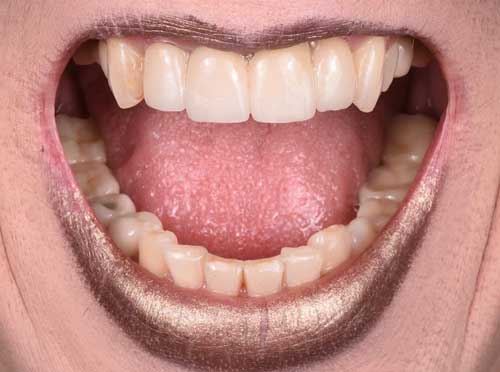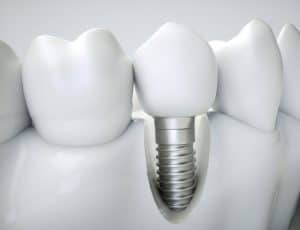Dental Implants
Would you like to have a radiant smile without gaps between your teeth until old age?
Sooner or later, most people lose their teeth for various reasons. Fixed or removable dentures become necessary. Tooth gaps should not only be closed for aesthetic reasons, but above all because they interfere with chewing function and can lead to misalignment or even loss of neighbouring and opposing teeth.
Good reasons for dental implants
Modern dental implants, such as those we offer in our practice, are a very good solution for tooth replacement if the indication is suitable. Implants take over the complete function of real teeth. They also feel and look convincingly real and natural. A particularly great advantage of an implant is that healthy, neighbouring teeth are completely spared. There is no need to grind down neighbouring teeth. Dental implants also provide a firm hold for dentures and other dental prostheses. Implants also fulfil the highest aesthetic requirements, maintain chewing power and prevent gradual bone loss.
Dental implants are one of the most important treatment methods in dentistry today. Their good tolerability and long durability have been proven in numerous clinical studies.
What material is an implant made of?
A dental implant is an artificial tooth root made of titanium or ceramic. These materials are particularly tissue-friendly and have proven themselves in medicine for decades. The result is a well-tolerated connection between the implant and the jawbone.
What is the procedure for implant placement?
- Planning
We start with a comprehensive consultation in our practice. Together we determine the best course of action. We will inform you about the risks and discuss the costs, as well as treatment alternatives and their advantages and disadvantage
- Digital impression taking with an intra-oral scanner
We need a dental impression for an implant. We create this digitally with the highest precision. An intra-oral scanner eliminates the need for a dental impression with a bulky impression tray and impression material.
The relevant areas are scanned digitally without touching them. The scan is almost always taken in the dental practice; we only use the manual technique in exceptional cases.
To ensure that the dentures fit perfectly into the row of teeth, the highest precision is required when taking the impression. The data obtained with the intraoral scanner calculates a 3D model that accurately depicts all structures. The denture can then be modelled on the monitor. The realisation then takes place in our dental laboratory.
- Implantation
The dental implant is inserted in an outpatient, minor surgical procedure under local anaesthetic. To do this, we open the mucous membrane and prepare the jawbone to receive the implant. Before screwing in the implant, we position it with millimetre precision, often using a special navigation system or a drilling template.
Sometimes bone augmentation or a sinus lift is necessary for the insertion of an implant.
The duration of the procedure depends on the complexity. You should expect the treatment to take around 30 minutes per implant.
The sutures are removed after about 10 days.
- Healing phase
The healing phase usually lasts between 4 and 6 months in the upper jaw. In the lower jaw, you should expect a healing period of 2 – 4 months. The duration depends on the bone quality and your individual healing process.
The implant must not be loaded during this phase. You do not have to manage without teeth during this phase. If several teeth are missing, we recommend a removable denture. In the case of a single tooth gap, a temporary plastic tooth is used.
A good temporary denture is one of the decisive prerequisites for a good healing phase.
- Dental prosthesis
After the healing phase, the visible dental prosthesis is placed on the implant. This can be a dental crown, a bridge construction or a denture anchorage.
- Faster wound healing with the A-PRF procedure (autologous blood therapy)
On request, we can offer you autologous blood therapy in our practice to support the healing process for implantations using the A-PRF procedure (advanced platelet rich fibrin). The therapy has been proven to accelerate the natural healing process and the formation of new jaw bone. Autologous blood therapy is a safe procedure.
We take a small amount of blood from you and process it using a special centrifuge. This separates the blood components. The fibrin, which is filtered out by centrifugation, favours healing. It is injected directly into the affected area.

How long do implants last?
There is no general answer here. The durability is highly dependent on your oral and dental hygiene. Smokers or patients with a weakened immune system have a higher risk of loss.
With good care, an implant can last a lifetime. Regular professional oral hygiene is important.
What does a dental implant cost?
The costs always depend on the materials used. In our practice, we only use the best materials from the world’s leading manufacturers in the field of implantology.
The price also depends on whether a bone augmentation or sinus lift is required and the type of temporary restoration is a cost factor.
Bear in mind that in the long term, an implant is usually the better financial decision compared to other solutions due to its long service life!
Contact us to book an appointment or for more information.
Online Booking

